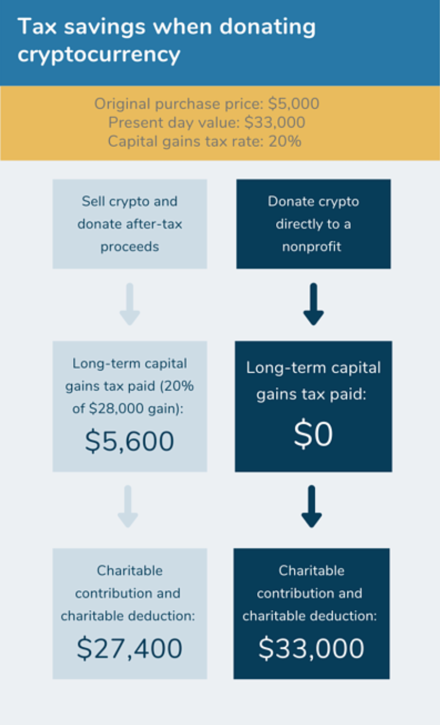

Digital assets, including cryptocurrencies, have rapidly grown in size and usage. As of March 2022, the global market cap of cryptocurrencies was roughly $2 trillion, up from $14 billion just five years ago. Moreover, according to a study conducted by Pew Research in 2021, around 16 percent of adult Americans – approximately 40 million people – have invested in, traded, or used cryptocurrencies. According to Fidelity’s 2021 Charitable Giving Report, crypto donations into its donor-advised funds doubled from $14 million in 2019 to $28 million in 2020.
As the cryptocurrency space grows, charitable organizations may benefit from accepting crypto donations. This blog post will discuss the benefits of accepting crypto donations, concerns, and how to set them up.
Accepting cryptocurrency (crypto) donations may result in fundraising growth and larger gift sizes. According to an analysis1 of one million nonprofit tax returns from 2010 to 2016, organizations receiving appreciated securities (such as stock and real estate) experienced 66% growth, compared to nonprofits accepting only cash gifts, which only experienced 11% growth. Since many cryptocurrencies, such as Bitcoin, have increased in value over the last several years, donors may be more likely to up their contributions if they can do so using their appreciated coins. The IRS currently views cryptocurrencies as property. Therefore, donors can avoid paying capital gains tax and receive income tax donations by donating appreciated cryptocurrencies instead of cash. Below is a hypothetical illustration of how contributing appreciated Bitcoin can result in a larger gift and increased tax savings for the donor.

Source: https://resources.freewill.com/cryptocurrency-what-nonprofits-need-to-know
Opening the doors to crypto donations may also grant access to a demographic of young and wealthy potential donors. According to a 2021 analysis conducted by Gemini, 71% of cryptocurrency owners fall between the ages of 25 and 44. Furthermore, 71% of individuals earning an income of at least $1 million own some form of cryptocurrency.
Accepting crypto donations also comes with some potential risks. First, crypto donations can occur anonymously, making it difficult to track their source. Organizations can alleviate this concern by requiring donors to share their personal information before making a gift.
Second, cryptocurrency values can be very volatile. As a result, organizations accepting crypto donations must decide whether to convert them into cash immediately or hold onto them. For most public charities, the general policy is to sell any contributed cryptocurrency promptly while reserving the right to sell at any time in the future.2
Lastly, laws regulating cryptocurrency are rapidly evolving as the space develops. On March 9, 2022, President Biden signed an executive order directing federal agencies to study and consider regulations on digital currencies. Therefore, organizations dealing with cryptocurrencies must ensure that they keep up with any legislation that may affect them.
One way to receive donations of crypto assets is to set up a crypto wallet or an account with a third-party crypto payment processor such as BitPay or Coinbase. These platforms allow you to hold cryptocurrencies and exchange them for dollars. Setting up a private hardware wallet carries unique risks and benefits beyond the scope of this blog. However, opening an account at a third-party platform is a simple and convenient method for most organizations.
Next, once you have an account that can receive incoming crypto, you can add a donation link and a form to your website. To avoid anonymous gifts, which can be hard to trace and steward, consider requiring donors to fill out a form with their personal information. Collecting this information can also assist in providing year-end tax receipts to donors.
These are the basic steps to get started in accepting crypto donations.
Cryptocurrencies are a rapidly growing asset class that has generated wealth for many people over the past several years. Allowing for crypto donations may lead to fundraising growth and access to a growing segment of crypto-wealthy individuals who would prefer to gift using their appreciated digital assets. As with any new asset category, there are significant risks and opportunities, and being open-minded to them may result in benefits in the future.